Our women’s empowerment programme, ongoing since 2009, has three main components:
i) Collectivising women at the community level to empower them to identify and address issues and enhance their participation in the public sphere
ii) Enabling women from marginalised communities to access entitlements and schemes, track and monitor their implementation, and seek greater accountability
iii) Addressing gender-based violence
Building Women’s Collectives
We currently have 20 women’s collectives across our five field clusters, with which approximately 600-700 women are directly associated. We establish the collectives and build the identities of women as leaders through rigorous processes. Our field mobilisers initiate dialogues with the women every week on gender, violence and developmental issues such as health and livelihoods. These perspective-building sessions enable the women to question the patriarchal norms that govern their lives and find ways to negotiate these constraints. Through these forums, the women also identify the pressing issues they face and the information and support required to resolve them.
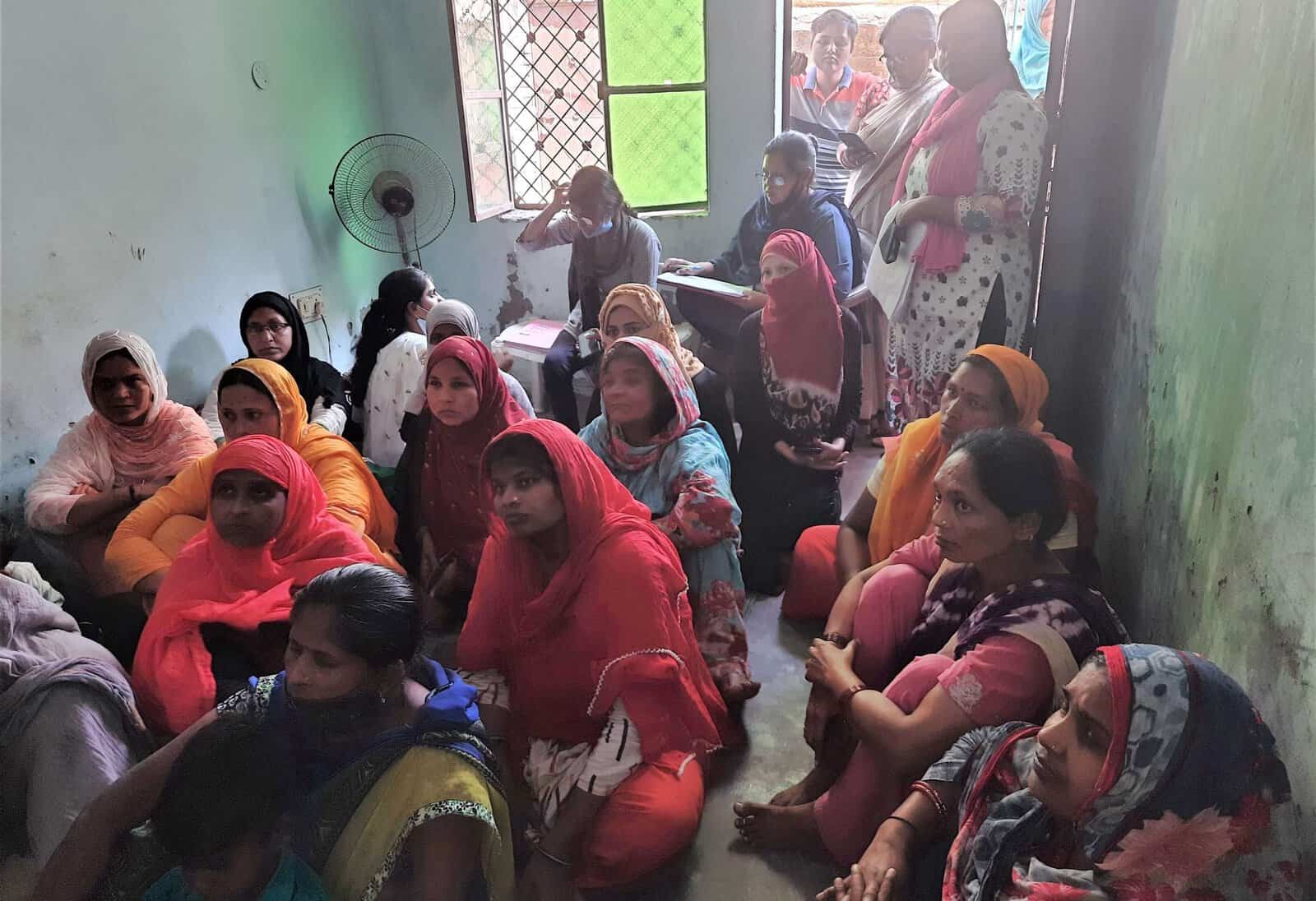
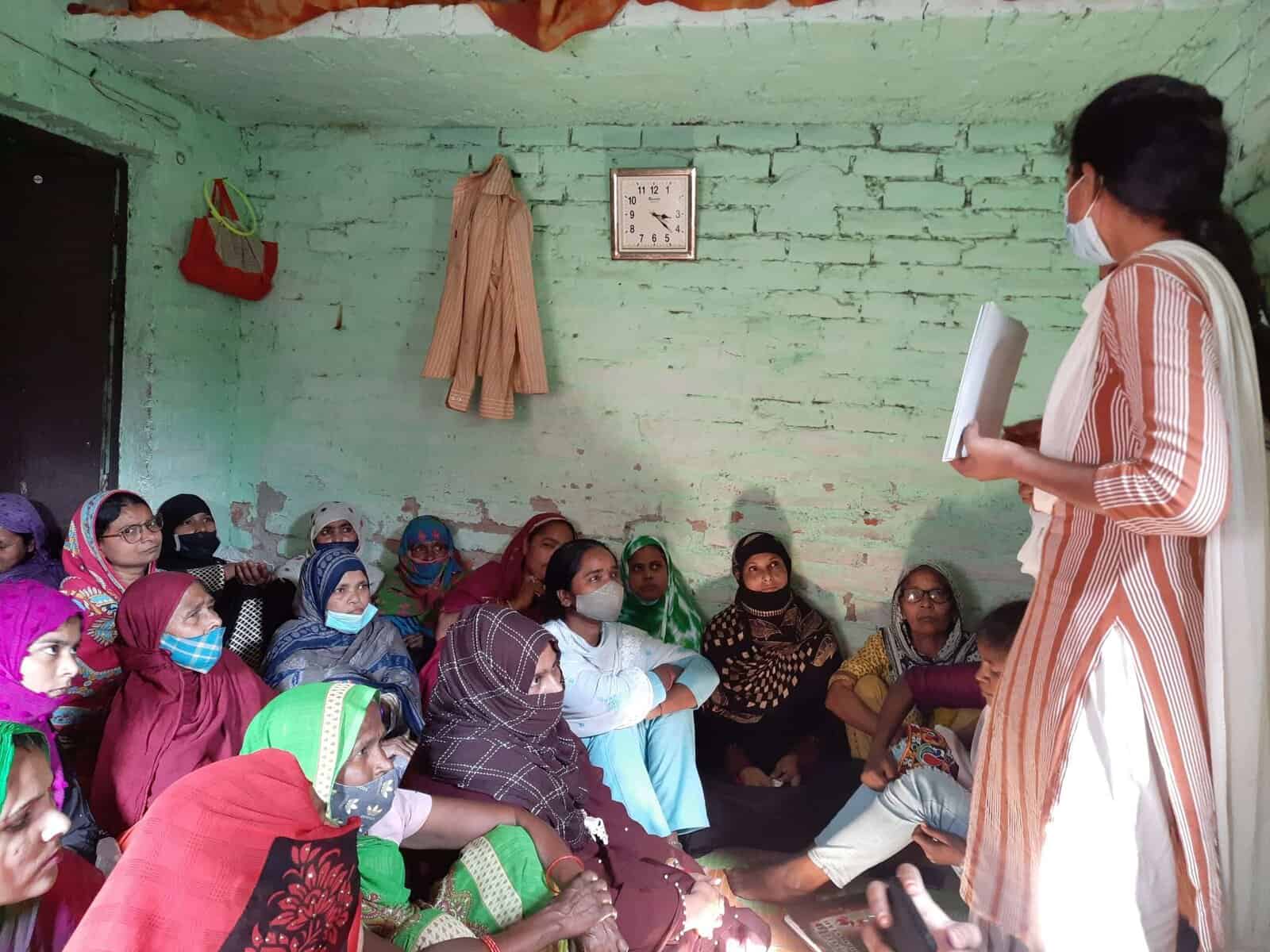
These women leaders become advocates for change in their neighbourhoods. They lead various community interventions that build awareness about violence against women or, more generally, promote gender equality. They also bridge the gap in communication and access between local stakeholders, such as political representatives or health workers and the community, by taking the lead in solving problems related to public facilities. The women’s collectives act as a conduit for information dissemination, the foundation for our other two interventions gender-based violence and entitlements.
Many of the women we work with are mothers of girls enrolled in our adolescent programmes, which strategically helps build support mechanisms between women and young girls. An expected outcome of our work in building collectives and women’s leadership is that they will support their daughters and other young women in realising their aspirations of completing their education, becoming financially independent, increasing their mobility to play roles outside the home and allowing them greater autonomy in making personal decisions.
Meet One of Our Women Leaders
Munni Begum* is a woman leader from Janta Nagari. Munni is from Mumbai, but was forced to move to Lucknow by her husband and subsequently not allowed to return to her natal home. Her marriage was violent. Ever since, she has fought a legal case against her husband and raised her two children single-handedly. Her difficult life circumstances and her involvement with Sadbhavana made her an advocate for women’s rights in her home and in the community. She persuaded her reluctant younger daughter to attend Sadbhavana’s basic and advanced leadership building programmes in 2013. Motivated by her mother, Munni’s daughter now works at a hospital and is a pillar of strength for her family. Munni’s elder daughter was preparing to take the central civil services examination when a rushed marriage during the coronavirus pandemic scuttled those dreams. She too is now a survivor of domestic violence. The Sadbhavana Trust has taken on her case and the young woman is now a participant in our advanced leadership-building course.
Munni Begum’s efforts have not been restricted to helping her own family. She is a valuable resource – armed with information, empathy and guts for other women and young girls who seek solutions to gender-based violence issues or the lack of access to basic facilities such as water and sanitation or healthcare.
Enabling Access to Entitlements
Women from marginalised communities lack the information and wherewithal to access government schemes and entitlements. This not only impacts them individually but is also a reflection of their marginalisation in the process of development and a negation of their rights as citizens. Our work in this area therefore aims to enhance marginalised women’s participation in the public sphere.
Once a month, we set up an ‘information desk’ in clusters where our women’s collectives are active. Women from the mohalla are given information regarding various government schemes and entitlements such as those related to food security, health benefits, cash transfers and educational scholarships. We then help the women access the schemes through follow-up services.
We also build the capacities of women leaders to analyse issues from a gender perspective and track government policies and schemes. Women occasionally conduct short surveys and use the findings to make visible the gaps and problems in implementation.

Women Monitor Covid-19 Entitlements
By 2020, when the gender dimension of the pandemic’s negative impact became starkly evident, the Indian government was pressed into announcing a cash transfer scheme for women. A sum of Rs 1,500 was to be transferred directly to women’s Jan Dhan bank accounts. The Sadbhavana team and women leaders carried out a field survey with 1,000 women to ascertain whether the money had reached the targeted beneficiaries and the problems they faced in accessing the benefits they were entitled to. We identified several problems, including finding that women did not have information about the scheme, did not receive the money or the full amount, or had to make several trips to the bank to withdraw the money. We also found that as most women did not have Jan Dhan accounts, those most in need were denied the benefits.
These first-hand experiences were documented. Recommendations were formulated and disseminated as part of an online campaign. And efforts were launched on the ground to address the problems identified. The online-offline information campaign reached 1000 women.
Combating Gender-based Violence
The scope of our work here includes:
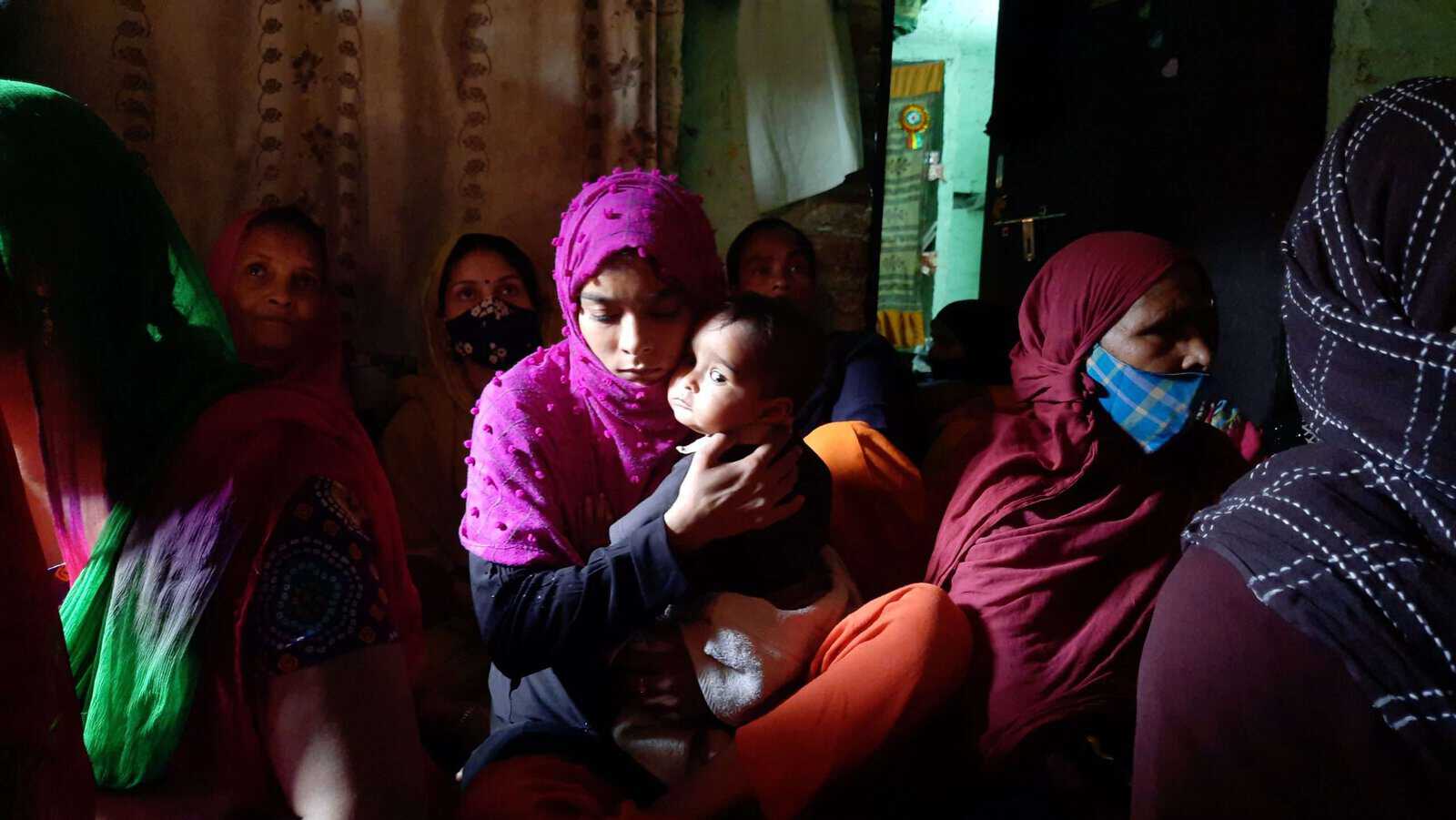
Prevention and Awareness
Our prevention and awareness work on gender-based violence is an integral part of our leadership course, sessions with the women’s and girls’ collectives, and through public campaigns. We conduct regular on- and off-line campaigns to build public awareness on gender-based violence, especially targeted at men and boys. The campaigns are also an effective way of increasing outreach and informing people about our programme and the kinds of support we provide. See More
Response
Our response to cases of gender-based violence is multi-dimensional. When women survivors of violence approach us we counsel them and help them make a decision on how they would like to proceed – whether they would prefer to go the legal route or resolve the issue through mediation. We work with survivors to put their interests first in finding a solution to their problems.
We provide legal aid to victims of violence. A paralegal counsellor (an alumna of our leadership course) supports the survivor through the typically tortuous legal process and coordinates with survivors and lawyers for case follow-ups, including helping her file a police report if required.
Between 2015 and 2017 we have taken up nearly 150 cases. The pandemic has seen increased incidences of violence against women and the Sadbhavana Trust has been approached by multiple survivors since. See More
Recognising that survivors require all kinds of sustained support, besides legal aid, we adopt a holistic and long-term approach to our work on violence against women. We meet with survivors on a monthly basis, conducting sessions on mental health issues and legal awareness. For the survivors, these monthly meetings are safe and supportive spaces that also allow them to build friendships and explore creative activities. The young women leaders provide community legal and emotional support.
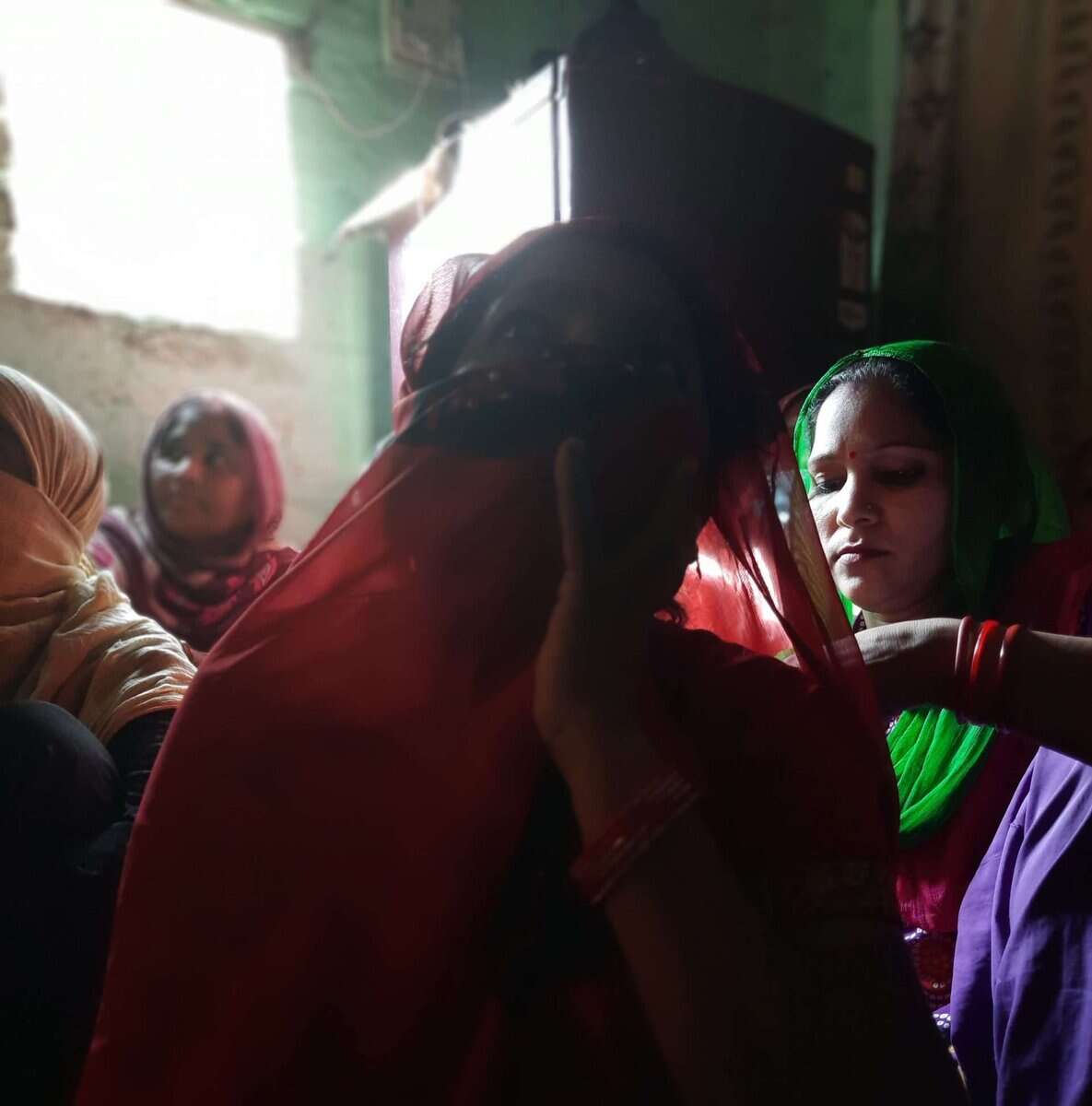
A Survivor’s Story
Firozi*, one of our field mobilisers, first came to us as a survivor of domestic violence in 2018. She was fighting a custody battle against her then husband and his family, as her new-born daughter was taken away by her in-laws. With the help of Sadbhavana’s legal and counselling support, she found the strength to take legal action. Her influential and financially secure husband managed to prevent her from seeing her daughter for over two years. Firozi’s mental health deteriorated but she found solidarity in the organisation and with the young women with whom she was participating in a feminist leadership-building training. After a long struggle she got her daughter back. Though her case is ongoing, she has been able to legally separate from her husband and is an independent single parent to a four-year-old girl and an integral part of our organisation.
Capacity-building

Sadbhavana Trust believes that capacity-building plays a crucial role in various aspects of our work on gender-based violence. Our capacity-building is conducted through intensive training of staff who are part of our leadership programmes, with community leaders and with women survivors of gender-based violence. The training sessions with staff include perspective-building, legal awareness and knowledge of procedures, and practical training. Exposure visits to police stations and courts are important in helping overcome women’s fears of approaching such institutions.
Supporting Cases of Grave Sexual Assault
We have provided long-term support in a few cases of grave sexual assault, by helping survivors pursue their legal cases as well as rebuild their lives by supporting their education and through counselling and solidarity.
Case 1
Simran* is a survivor of child sexual abuse. She was repeatedly raped by her father over a period of four years, starting from when she was 15. When her father enrolled her elder sister in a computer course and Simran in a nursing school in the town of Orai, the sisters rented a room to live in. Every time Simran was alone in the room, he would use the opportunity to rape her again. Simran finally gathered the courage to tell her friends, who devised a plan to document the crime. A mobile phone was placed so that he could not see it and when her father arrived, Simran turned on the camera. In March 2016, she submitted the video to the police and an FIR was lodged against Simran’s father, who was arrested immediately. When Simran’s case was brought to the Sadbhavana Trust, the girl’s educational plans were discussed and she was admitted to a nursing college in Bhubaneswar*. In November 2016, a court delivered a verdict of life imprisonment for Simran’s father along with a penalty of Rs 5 lakh. In the years since and with the support she has received, Simran has put enough of her trauma behind her to gain the confidence to live life ‘normally’, travelling alone between Bhubaneswar and Lucknow, meeting people, taking part in everyday conversations.
Case 2
Bitiya* belongs to a Dalit family in Kannauj* which served an upper-caste Thakur family. In February 2012, she was gang-raped by four of the Thakur family boys. Not only did the police refuse to register a case, Bitiya was expelled from school as she was stigmatized for the rape. Her family went to four other districts to finally get a police case registered. Despite an FIR being lodged, the accused weren’t arrested. For four years, Bitiya and her family sought justice but made no headway. In 2014, Bitiya lost her father and the following year, she lost the case in court. The family’s finances became dire. Despite the Thakur family offering her Rs 5 lakh to drop the case, Bitiya and her family stuck to their goal. With Sadbhavana’s intervention, Bituya’s case is being pursued in the Allahabad High Court and she is continuing her studies. Bitiya is still hoping that justice will be served.
Networking and Advocacy
We actively participate in various networks and collaborate with other organisations to make visible the issue of gender-based violence, work to make laws more gender-responsive, improve services and highlight lacunae in addressing cases.
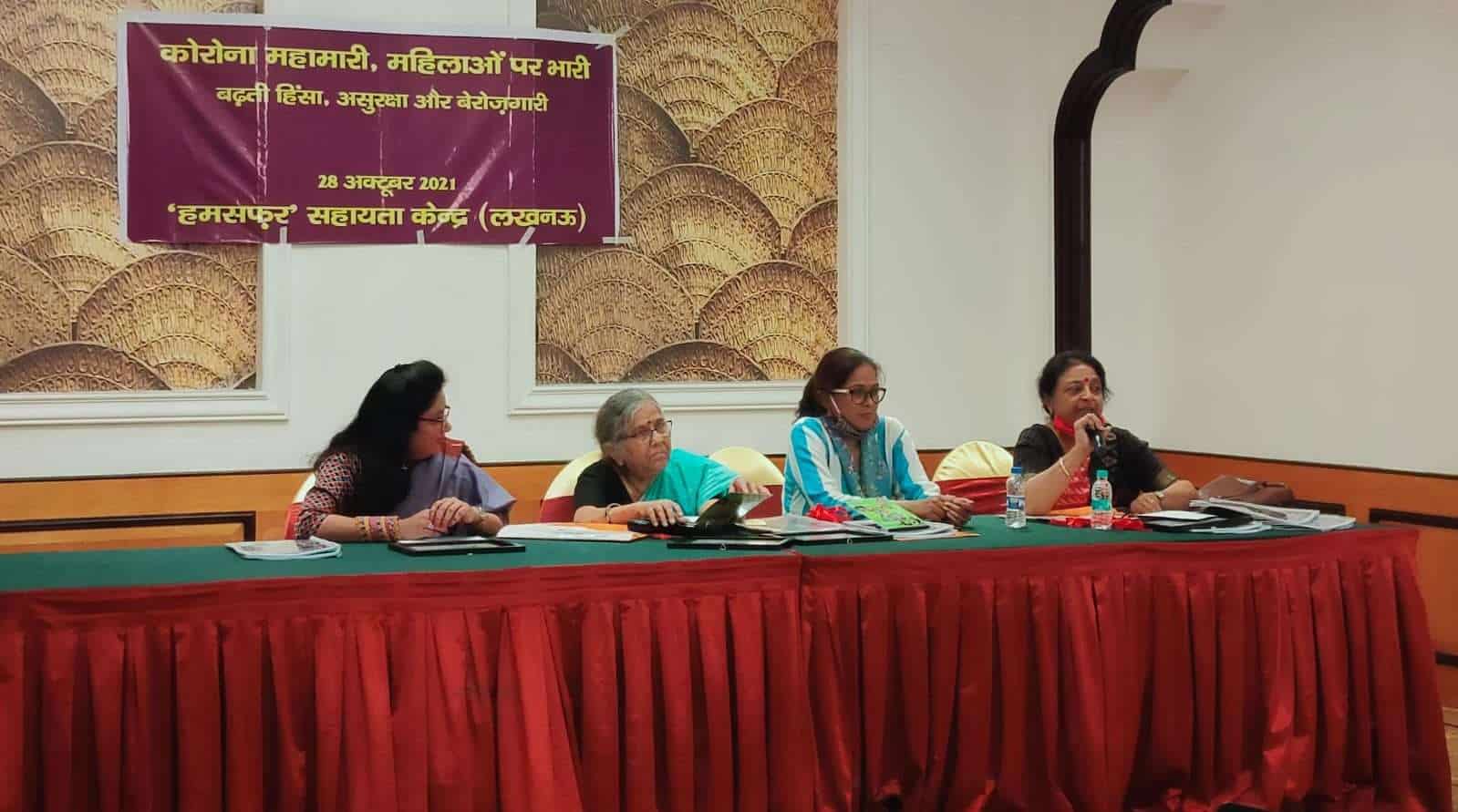
*All names changed to protect identities